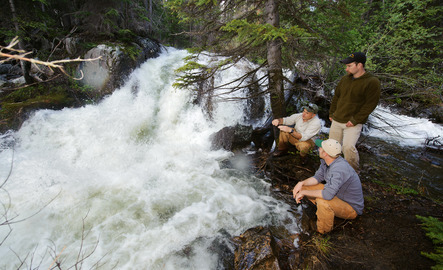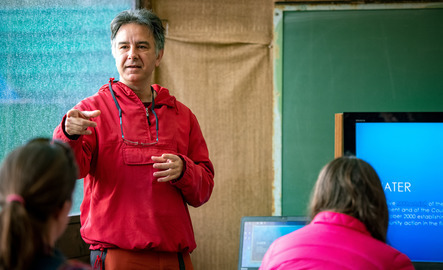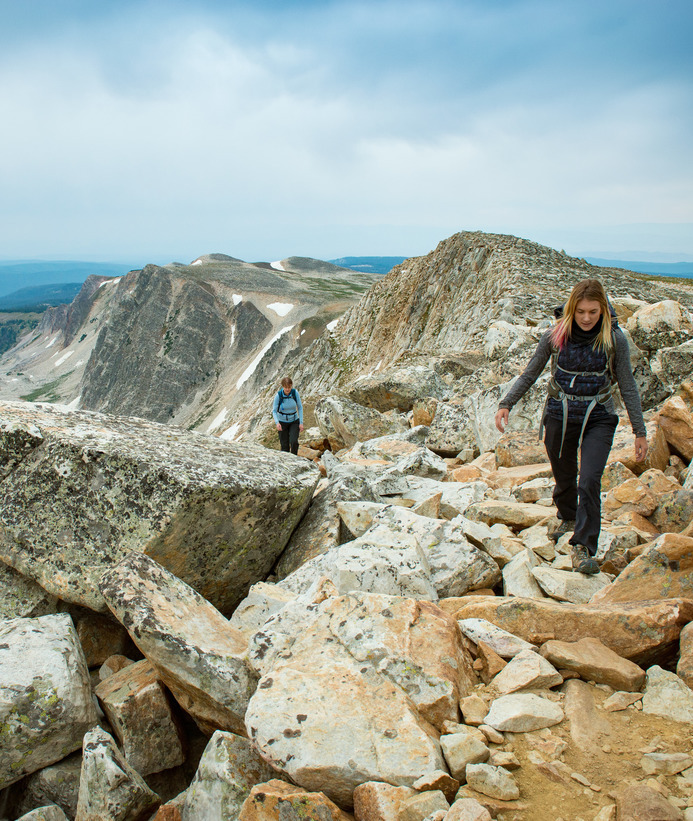About the Environment, Natural Resources and Society Master’s Program
The environment, society and natural resources master’s program (ENRS) is an excellent place to further your career in conservation and research. Our program utilizes a cohort model to build peer relationships and encourage students to work together toward solutions for pressing environmental challenges. As part of this program, you will take innovative courses in ecology, water resources, conservation and more. You’ll additionally work with our accomplished faculty members and gain hands-on fieldwork experience.

Applicants to the M.S. in environment, natural resources and society must apply directly to the University of Wyoming. Applications for graduate assistantships should be directed to the Haub School of Environment and Natural Resources.
UW’s natural resource degree program is led by dedicated and highly-regarded faculty, including:
- Dr. Drew Bennett — Read about Dr. Bennett’s work with the MacMillan Private Lands Program.
- Dr. Corrie Knapp — Her research focuses on climate change adaptation, rural livelihoods, and social–ecological systems in Western rangelands, with an emphasis on water availability, community resilience and applied decision-making for natural resource management.

What Can You Do With an Environment, Natural Resources and Society Master's Degree?
With a master’s in Environment, Natural Resources and Society, you can turn your passion into impact! Whether it’s shaping policy, leading conservation efforts or driving sustainability in business or nonprofits, this degree opens doors to meaningful, purpose-driven careers.
- Research Associate
- Director of Conservation
- Conservation Director
- Public Involvement Associate
- Environmental Policy Analyst
- Natural Resource Manager
- Sustainability Coordinator
- Environmental Consultant
- Climate Change Analyst
- Land Use or Urban Planner
- Wildlife or Fisheries Manager
- Renewable Energy Project Manager
- Environmental Justice Advocate
- Corporate Sustainability Advisor
- Government Affairs or Legislative Analyst
- Community Engagement Coordinator
- Ecotourism or Recreation Planner
- Environmental Communications or Media Specialist
- Environmental Impact Assessment Specialist
- University of Wyoming WORTH Initiative
- Property and Environment Research Center (PERC)
- Sheridan Community Land Trust
- The Langdon Group
Absolutely! From the very beginning of your master's studies, students are encouraged to jump into research. For example, during an overnight visit, students stay at an educational facility in the Platte Valley and spend time interacting with scientists, landowners and agency employees. Most recently, students explored the dual challenges of water and wildlife management and visited the Saratoga hot springs.
A master’s degree can set you apart in the competitive environmental field, offering deeper expertise, leadership skills and hands-on experience. It opens doors to advanced roles, higher salaries and greater impact in government, nonprofits, research and industry.
ENRS Grads Making A Difference
ENRS graduate student Janna Black received an “Adapting to Climate Change in Wyoming”
grant from the Western Water Assessment and the University of Wyoming Center for Climate,
Water and People.
For her project, she partnered with the Greater Yellowstone Coalition to implement
Indigenous youth culture and climate day camps in Kinnear, WY. To accomplish this,
she partnered with the Northern Arapahoe Tribal Historic Preservation Office, Wyoming
Indian Schools, Yellowstone and Grand Teton National Park and many others.
“I would not have gotten [a job in the facilitation field] without being in the ENRS program for two reasons. First, my boss was a guest speaker in Corrie Knapp's ENRS 5900 class and talked to us about natural resources facilitation. I then used my collaborative practicum to interview my boss, which made the connection. Second, taking Steve's facilitation class and the Collaborative Practice minor gave me the collaboration chops to feel confident going into the interview. I got that interview because I reached out to my boss while I was in the job search phase just trying to get some advice on applying to this field. She then responded, well we are hiring right now, you should apply! There was definitely a little bit of luck there, but because I made the connection in class, deepened through my collaborative practicum, and solidified my skills with the Collaborative Practice Minor, I was able to get the job."
- Will Benkelman | M.S. ENRS ‘23


